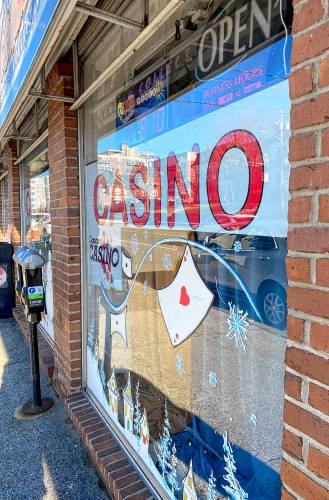What’s next for Concord casino?

The Concord Casino “open” light is not on at the downtown building on South Main Street on Tuesday. GEOFF FORESTER / Monitor staff
|
Published: 01-02-2024 4:44 PM
Modified: 01-06-2024 11:28 AM |
Future attempts by Andy Sanborn to operate a casino in the state will be met with challenging regulatory hurdles after his gaming license was suspended last week by the New Hampshire Lottery Commission.
Sanborn, a former state senator who owns and operates Concord Casino through his business WIN WIN WIN LLC was ordered to shut down his gambling operation on Jan. 1 as he faces a six-month suspension of his gaming license. In addition, Sanborn was told to sell the business within six months, or risk facing a harsher consequence – a two-year revocation of his license.
Concord Casino must be sold to a Lottery Commission-approved buyer and undergo a licensing process, similar to any new operator looking to receive a gaming license. But the ruling by independent hearing officer Michael King isn’t a lifetime ban either. A potential appeal could further complicate the situation.
King’s decision left certain questions unanswered about a path back for Sanborn to operate one of the state’s 14 charitable gaming establishments or the future of a larger casino and event center on Loudon Road, which he and his wife State Rep. Laurie Sanborn got approved by the Concord Planning Board.
If the new casino is built, Sanborn cannot just operate the casino once the suspension is lifted.
He must undergo a suitability review by both the Department of Justice and the New Hampshire Lottery Commission, the same government entities that investigated Sanborn’s use of COVID funds and found him unsuitable to be involved with charitable gaming.
Sanborn applied for and received $844,000 in COVID relief funds, which were intended for struggling small businesses. Casinos were explicitly excluded from receiving financial assistance. Sanborn managed to sidestep this restriction by masking the registered trade name “Concord Casino” on his application by utilizing the name “Win Win Win LLC” instead and categorized the business activity as “miscellaneous,” according to a report by the Attorney General’s Office and the Lottery Commission. His lawyers later argued the company was a charity gaming consulting business.
“The misrepresentations on the (COVID) application and the subsequent use of the proceeds for expenditures not allowed by that loan constitute conduct by the licensee that undermines the public confidence in charitable gaming,” King wrote in his nine-page ruling.
Article continues after...
Yesterday's Most Read Articles
 New Hampshire legalizes public alcohol consumption in designated ‘social districts’
New Hampshire legalizes public alcohol consumption in designated ‘social districts’
 State rules Epsom must pay open-enrollment tuition to other school districts, despite its refraining from the program
State rules Epsom must pay open-enrollment tuition to other school districts, despite its refraining from the program
 Town turmoil: Chichester town administrator resigns again
Town turmoil: Chichester town administrator resigns again
 New Hampshire providers brace for Medicaid changes that reach beyond healthcare
New Hampshire providers brace for Medicaid changes that reach beyond healthcare
 Warner town administrator granted restraining order against selectman
Warner town administrator granted restraining order against selectman
 NH judge decides to pause Trump’s birthright citizenship order
NH judge decides to pause Trump’s birthright citizenship order
Sanborn faces accusations of extravagantly spending the funds received from the loan on two Porsche race cars for $181,000 and $80,000 on a Ferrari for his wife. Additionally, he paid himself over $183,000, disguised as rent for his properties.
His legal team argued that he had enough cash on hand and in other accounts to pay for the luxury cars with his own money instead of using relief funds he received and put into his general operating account.
King dismissed that argument, writing that there was a “straight line” from the receipt of the loan to the purchase of the automobiles.
With the casino on Main Street closing on Monday, charities are left in an uncertain position.
Typically, gaming facilities plan 30 to 60 days in advance to fill their calendars with charities on a rotating schedule to receive donations.
But now, charities or non-profit organizations already on Concord Casino’s schedule find themselves searching for alternative gaming facilities to secure a spot for donations.
The Timberlane Music Association, a boosters club for the school district’s music program, has been on Concord Casino’s waitlist for six to eight months.
“It’s disappointing that it’s not going to work out with this one. We’re already on the waitlist for a couple of others,” said Brian Stack, president of the club. “But I’m sure there will be a lot of charities scrambling to find other sites now to get the waitlist.”







 ‘A little piece of everything I like’: New Pittsfield barbershop brings more than a haircut to downtown
‘A little piece of everything I like’: New Pittsfield barbershop brings more than a haircut to downtown Canterbury honors ‘real heroes’ with updated Military Veterans’ Project
Canterbury honors ‘real heroes’ with updated Military Veterans’ Project Look, up in the sky! It’s… an Airstream trailer?
Look, up in the sky! It’s… an Airstream trailer?
